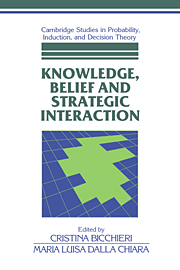Book contents
- Frontmatter
- Contents
- Preface
- List of contributors
- 1 Feasibility
- 2 Elicitation for games
- 3 Equilibrium, common knowledge, and optimal sequential decisions
- 4 Rational choice in the context of ideal games
- 5 Hyperrational games: Concept and resolutions
- 6 Equilibria and the dynamics of rational deliberation
- 7 Tortuous labyrinth: Noncooperative normal-form games between hyperrational players
- 8 On consistency properties of some strongly implementable social choice rules with endogenous agenda formation
- 9 Algorithmic knowledge and game theory
- 10 Possible worlds, counterfactuals, and epistemic operators
- 11 Semantical aspects of quantified modal logic
- 12 Epistemic logic and game theory
- 13 Abstract notions of simultaneous equilibrium and their uses
- 14 Representing facts
- 15 Introduction to metamoral
- 16 The logic of Ulam's games with lies
- 17 The acquisition of common knowledge
- 18 The electronic mail game: Strategic behavior under “almost common knowledge”
- 19 Knowledge-dependent games: Backward induction
- 20 Common knowledge and games with perfect information
- 21 Game solutions and the normal form
- 22 The dynamics of belief systems: Foundations versus coherence theories
- 23 Counterfactuals and a theory of equilibrium in games
2 - Elicitation for games
Published online by Cambridge University Press: 05 November 2011
- Frontmatter
- Contents
- Preface
- List of contributors
- 1 Feasibility
- 2 Elicitation for games
- 3 Equilibrium, common knowledge, and optimal sequential decisions
- 4 Rational choice in the context of ideal games
- 5 Hyperrational games: Concept and resolutions
- 6 Equilibria and the dynamics of rational deliberation
- 7 Tortuous labyrinth: Noncooperative normal-form games between hyperrational players
- 8 On consistency properties of some strongly implementable social choice rules with endogenous agenda formation
- 9 Algorithmic knowledge and game theory
- 10 Possible worlds, counterfactuals, and epistemic operators
- 11 Semantical aspects of quantified modal logic
- 12 Epistemic logic and game theory
- 13 Abstract notions of simultaneous equilibrium and their uses
- 14 Representing facts
- 15 Introduction to metamoral
- 16 The logic of Ulam's games with lies
- 17 The acquisition of common knowledge
- 18 The electronic mail game: Strategic behavior under “almost common knowledge”
- 19 Knowledge-dependent games: Backward induction
- 20 Common knowledge and games with perfect information
- 21 Game solutions and the normal form
- 22 The dynamics of belief systems: Foundations versus coherence theories
- 23 Counterfactuals and a theory of equilibrium in games
Summary
INTRODUCTION
One of the questions often asked of subjective Bayesian game theorists is where the prior (on opponents' moves) “comes from.” That is, how can such a probability distribution be elicited. This chapter addresses that question and shows that elicitation for games is exactly the same as elicitation for decision problems that involve uncertainty arising from other sources than the behavior of an opposing player. We review the elicitation of a single uncertain event, many events, dependence between action and state, and sequential decision problems. Each of these are shown to have application to game-theoretic contexts. The subjective Bayesian approach to game theory is thus shown to be operational.
We take standard Bayesian utility theory in the sense of Ramsey, Savage, and DeGroot as a standard of rational behavior. While we have studied various relaxations of these principles in other work, such as finite additivity: (Levi 1980, §§5.7, 5.9, 5.11,12.16; Schervish, Seidenfeld, and Kadane 1984), state-dependent utility (Seidenfeld, Schervish, and Kadane 1990), and ordering (Levi 1974, 1980, 1986; Schervish, Seidenfeld, and Kadane 1990), the only relaxation of importance for this paper is possible dependence between act and state. To those principles we would add other principles or accept constraints on these principles only reluctantly. A general review of the consequences of this stance for game theory is given in Kadane and Larkey (1982, 1983) (see also Harsanyi 1982). The issue we address here is how to find the prior opinions, with the intent of being operational.
- Type
- Chapter
- Information
- Knowledge, Belief, and Strategic Interaction , pp. 21 - 26Publisher: Cambridge University PressPrint publication year: 1992



